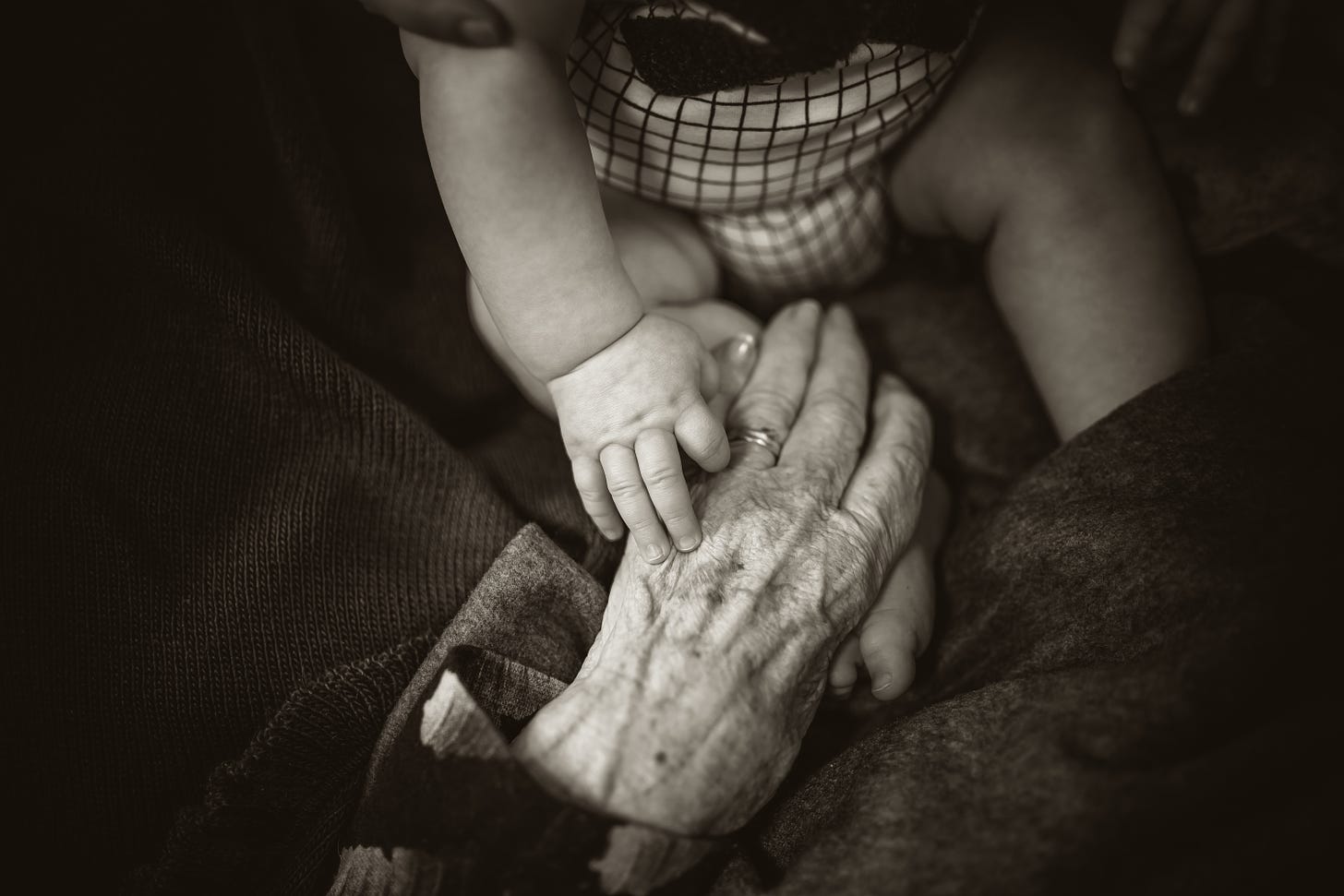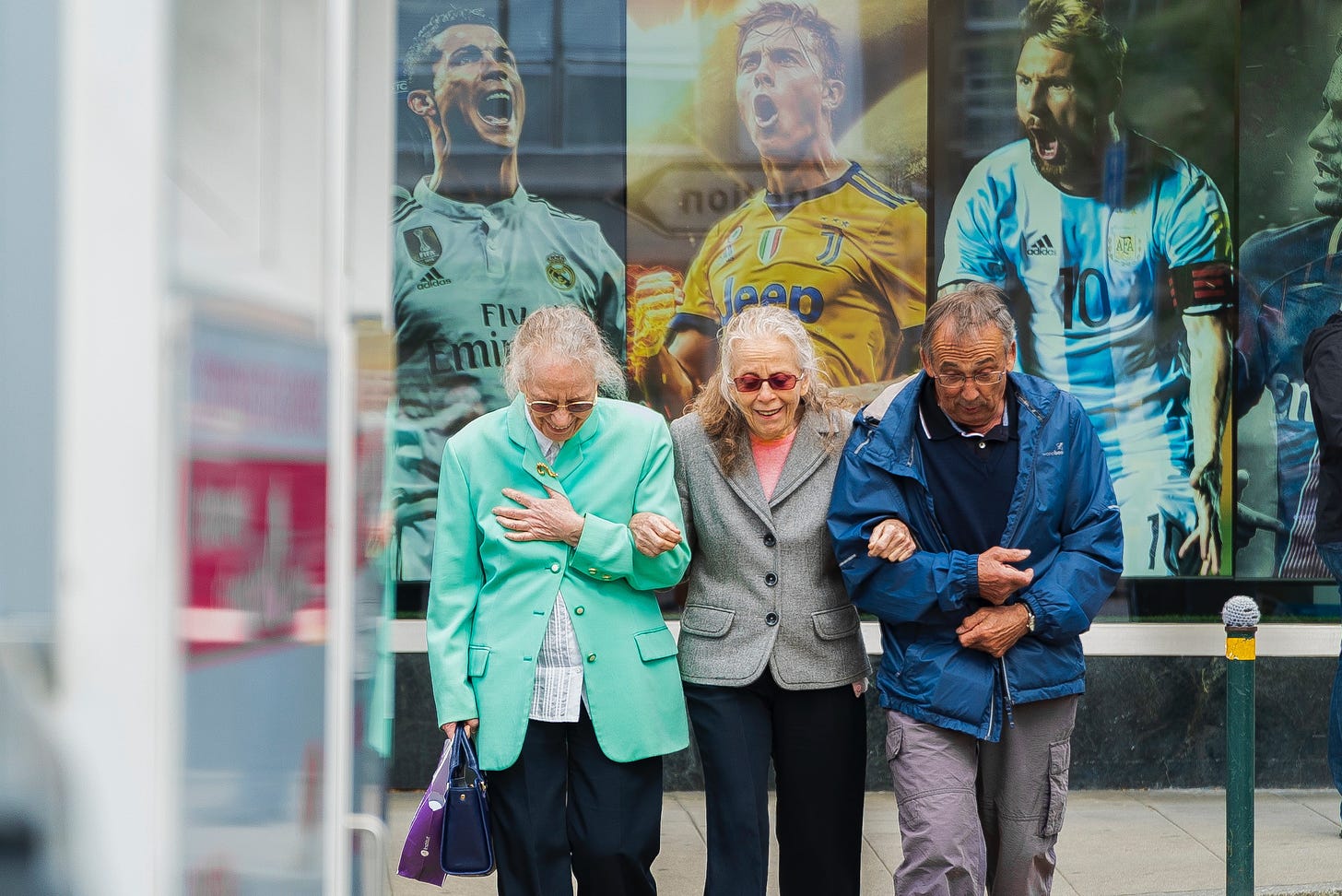Dear Friends,
How do you feel about aging? What’s your least favorite or most favorite thing about aging? Please share in the comments, or hit reply to this email. Your answers help me know how to serve you better.
This month, I want to share six opportunities of aging. Read on, and let me know the ones you’re discovering or others I left out.
Disappearing Eyebrows
“Who are you?! Where is Elizabeth, and what you do with her eyebrows?” So goes a morning conversation I frequently have with my mirror. My fading eyebrows are just one of many daily signs that my body is succumbing to the erosion of aging.
Indeed, aging changes us, and not always for the better. Hair turns gray, hair disappears, hair grows out of our ears. We face new limitations: we can no longer drive at night, live at home alone, or stay up late. We experience startling weakness: we forget our neighbor’s name, we need help carrying a bag of groceries into the house. We endure new levels of loneliness: our loved ones die, our children live far away, we can’t get to church. And perhaps worst of all, our own death hurtles toward us at a frightening pace. When you consider the many losses of aging, it’s little wonder we fend it off fiercely or simply pretend it won’t happen to us.
What if, instead of trying to mask it with wrinkle creams and hair color and cryotherapy, we faced the “evening of life,” as one friend calls it, head on, inviting God to meet us in this space and reveal his purpose in it?
But it will. Whether we like it or not, we’re all aging by the second. What if, instead of trying to escape it, we decided to embrace it? What if we moved toward aging, pondering it and praying over it? What if, instead of trying to mask it with wrinkle creams and hair color and cryotherapy, we faced the “evening of life,” as one friend calls it, head on, inviting God to meet us in this space and reveal his purpose in it? What opportunities of aging might we discover?
The Bible gives us every reason to hope that as we enter the losses and limitations of aging, we will discover God’s profound purpose for our advancing years. Aging affords the opportunity to grow more dependent on God and others even as we grow less dependent on our own strength. Aging invites us to grow more humble in acknowledging that we cannot save the world or ourselves. Aging helps us to become more adaptable as we relinquish our trust in our own competence and control. As we embrace the opportunities of aging, we might discover as Alice Fryling, author and spiritual director, did, “I need to trust that while there may be less of me, there will be more of Christ” (Aging Faithfully: The Holy Invitation of Growing Older, xiii).
Will you join me in considering at least six opportunities aging affords us?
1. To become more fruitful even as we may be less productive.
Fryling describes productivity as “tasks we accomplish” and fruitfulness as something that “comes from within and includes non-tangible ways I relate to others” (Fryling, 9).
Some of us enjoy our task lists more than others. Personally, I’ve always enjoyed my ability to be productive, and if I’m honest, I’ve even taken some pride in it. And yet, in the past twenty years, a joint hypermobility syndrome mixed with my years of athletic endeavors tore away at my body. Nine major orthopedic surgeries later, I’m simply unable to be as productive as I once was. When we need to move chairs at church for a women’s event, I have to excuse myself. When invited to lead a retreat in a faraway country, I have to say “no.” As I’ve become less productive, I have seen God transforming my task-oriented self. He gently reminds me that he doesn’t love me for what I can accomplish, he simply loves me. Aging, when we can accept the limitations, can grow fruit, the fruit of patience, the fruit of kindness, the fruit of empathy for others.
2. To learn to care well for our bodies.
Sadly, many of us learned to devalue our bodies and some of us harbor outright contempt for them. Somewhere along the way in church we got the idea that the spirit or soul is what matters to God, not the body. And yet, the bodies we inhabit were created by God, exquisitely crafted: “For you formed my inward parts; you knitted me together in my mother’s womb. I praise you, for I am fearfully and wonderfully made” (Psalm 139: 13-14).
Our bodies, the temple of the Holy Spirit, have a purpose: to glorify God (1 Corinthians 6:19). As we age, we can’t get away with pushing them through eighty hour work weeks. God invites us into a new relationship with our bodies, to care for them as he does, with rest and good food and exercise and breathing and general gentleness. As we face the limitations of aging on our bodies, we have a choice—to curse them for not working the way they once did, or to bless them with tender care.
3. To discover that God is with us as we grieve our losses.
As we noted earlier, we suffer many losses as we age—physical, mental, relational. Rather than denying our losses or embittering our hearts, we can receive God’s invitation to grieve with him. Throughout Scripture we discover a God who is with people in their grief. Jesus wept with his friends Mary and Martha, even knowing he would raise Lazarus from the dead (John 11). God counts the tears we shed as we say good-bye to work we enjoyed and gifts he gave us for a season (Psalm 56:8). As we mourn the death of beloved friends and family, “The Lord is near to the brokenhearted and saves the crushed in spirit” (Psalm 34:18). When we draw near to God in our grief over the losses of aging, we discover a God who has drawn near to us with his kindness and comfort.
Photo by Philippe Leone on Unsplash
4. To form new community in seasons of loneliness.
Sadly, many of us as we age will be forced to live somewhere other than the home we have known and loved. With the loss of our home comes a loss of community, neighbors, friends, and churches. This loss presents us with a choice—we can either close in on ourselves or reach out—to God and to others. A ninety-year-old woman in our church lost her beloved husband years ago, but she refuses to remain isolated. Weekly, she hauls her well-worn Bible to women’s Bible study; by her mere presence she bears the glory of God’s wisdom and grace. In addition to reaching out to community, we can also turn to the Lord, where we will find a new and deeper intimacy.
5. To prepare a legacy that guides and blesses those we leave behind.
It is never too early to prepare for the day when we will no longer be with our loved ones. Rob Moll, a thirty-something journalist, while working at a funeral home for a season, insisted that he and his wife discuss the details they would need if one of them were to die or become incapacitated. They could not have known they were preparing for a day that would come relatively soon—Rob died in a mountain climbing accident at the age of 41, leaving a wife and four children.
We who are actively in the “aging” camp have a powerful opportunity to bless our loved ones by preparing our legacy. In addition to advance directives and wills and password information and end-of-life wishes, we can begin sharing our values and our stories now, the stories we want our loved ones to remember forever. We can “give with a warm hand rather than a cold one,” letting go of some things now so we might enjoy others’ enjoyment of these gifts. If you’re interested in a group coaching workshop to help you prepare your legacy, be sure to check out Organizing Your Life and Legacy.
6. To prepare to die well.
Before the advent of modern medicine, it was common for people to consider their deaths, to think about how to “die well.” Literature called the “ars moriendi,” (the art of dying) helped people perform the important tasks to close out their lives.
Dr. L.S. Dugdale, in her 2020 book, The Lost Art of Dying, describes an eighty-year-old woman who became enraged as she approached death, demanding of the doctor, “What happens to me when I die? I don’t know what I believe” (135). As Dr. Dugsdale pointed out, her patient’s anger likely masked her fear of the unknown. Christians have the assurance that death will be followed by resurrection, first of our spirit in heaven, where we will be in the presence of the triune God and all believers who have died before us. Later, Christ will raise our bodies and we will live forever in the new heavens and the new earth, a place where there is no more mourning or pain or crying or sin (Revelation 21-22). As aging shuttles us closer to the day of our death, we have the opportunity to grow confident and hopeful, to prepare to “depart in peace” (Luke 2: 29). We can do so by asking questions, raising doubts, expressing concerns, to a pastor, ministry leader, or friend. Many, including me, would love to walk alongside you in that normal fear of death.
Friends, be encouraged. Aging is hard and there is no escaping it, but as we embrace the opportunities, we will discover a God who is with us in it and who is changing us by it.
How about you? What opportunities of aging have you discovered, for yourself or as you observe others?
Do you have questions about how to prepare your legacy or concerns about death? Please hit “reply” or leave a comment.
Would you like to read more about aging?
Alice Fryling, Aging Faithfully: The Holy Invitation of Growing Older (Colorado Springs: Navpress, 2021).
Fryling, a spiritual director, discusses many opportunities of aging and encourages us to grow closer to God as we age.
Sharon Betters and Susan Hunt, Aging with Grace: Flourishing in an Anti-Aging Culture (Wheaton: Crossway, 2020)
Sharon Betters and Susan Hunt offer a biblical perspective on aging, weaving biblical wisdom with stories of older people who are “flourishing in an anti-aging culture.”
L. S. Dugdale, The Lost Art of Dying: Reviving Forgotten Wisdom (New York: HarperOne, 2021). Dugsdale, a physician, shares her medical perspective, explaining how recovering the “lost art of dying,” the intentional preparation for death, can help us to live well.





Are you familiar with the BBC series Call the Midwife? It is very well done and the first season was based on a trilogy written by Jennifer Worth. She also wrote a book titled In the Midst of Life based on her nursing experience a few decades ago. My copy of that book is currently loaned out, but it focused a lot on end of life health. I think you would like reading her perspective on end of life concerns in the sixties.